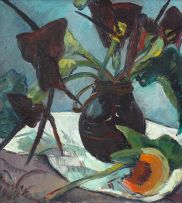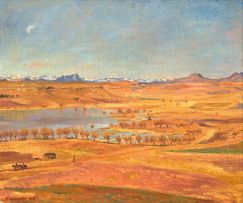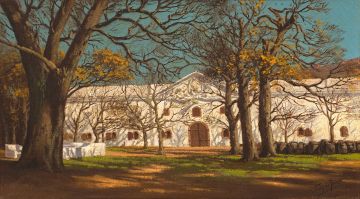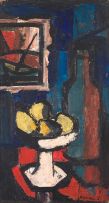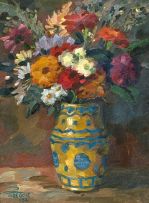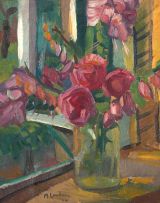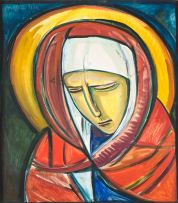Important South African and International Art, Decorative Arts & Jewellery
Live Auction, 16 October 2017
Evening Sale
Incl. Buyer's Premium & VAT
About this Item
signed and dated 1941; inscribed with the artist's name, address and title on the reverse
Notes
The present lot has been identified by the South African Heritage Resources Agency (SAHRA) to be of "outstanding significance" and its export would be "a loss to the national estate". As such, it is not suitable for export.
"There are many fine flower still lifes by Irma Stern and these are highly sought-after on the art market and they fetch very high prices. Many of these works feature flowers which are not indigenous to Africa, such as dahlias and magnolias. Calla Lilies or Arum lilies, however, are indigenous to Southern Africa, and are commonly known as white. A well-known still life by Stern, featuring an African stool and white Arum Lilies is in the collection of the South African National Gallery. This painting, however, features the most unusual black variety. The calla lily, or zantedeschia, is a genus of twenty-eight different species all native to the southern parts of Africa from South Africa up to the latitude of northern Madagscar.
The genus was named by the famous Swedish botanist Carolus Linnaeus but as it became apparent that the genus needed to be split up, the German botanist Karl Koch named the new genus after his fellow botanist Giovanni Zantedeschi from Italy.
Calla lilies became popular in Europe as a wedding flower, although they also have significant associations with death and funerals. Their inclusion in this fine still life by Stern therefore makes them seem redolent of the memento mori - symbols of reminders of mortality - that we encounter in Dutch flower paintings and still lifes, for example. The unusual inclusion of these lilies and the fine formal qualities of this painting make this a startling work in aesthetic terms'." 1
Esmé Berman ranks Stern first among South African flower painters in Art and Artists of South Africa (1983: p167), comparing her flower pieces to those of Maggie Laubser's arum lilies, Pieter Wenning's depictions of hibiscus flowers, and Frans Oerder's magnolias. Berman also points out that, unlike botanical artists, Stern's renderings of indigenous flowers are treated as organic still-life objects, almost invariably displayed in domestic vases placed in an interior setting. Botanical artists, on the other hand, focus on the scientific properties of the flower devoid of any natural context.
In the present lot Stern chose not to adorn this still-life with her usual masks, figurines and African textiles. Instead, she draws attention to the formal qualities of the flowers, exploring the science of artistic forms and shapes, and introduces dramatic contrasts by placing a single slice of bright orange pumpkin in the right-hand corner of the picture plane.
1 South African Heritage Resources Information System (SAHRIS), via SAHRA's website http://www.sahra.org.za/
Literature
Sandy Shoolman (ed). (2008) The Modern Palimpsest: Envisioning South African Modernity, Catalogue No 5, Johannesburg: Graham's Fine Art Gallery. Page 64 and illustrated in colour on page 65.

